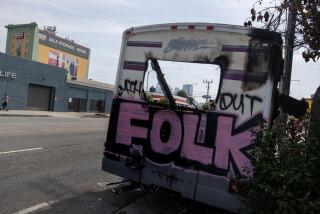L.A. to Give Addicts AIDS Kits of Condoms, Bleach
- Share via
The Los Angeles City Council on Tuesday unanimously approved distribution of bleach and condoms to fight the spread of AIDS among drug users.
The action was requested by Mayor Tom Bradley, who called it “a matter of human decency.”
The council set aside $25,000 to finance the bleach-and-condom program until the fiscal year ends on June 30.
The money will pay for about 60,000 AIDS prevention kits, each containing a bottle of bleach for sterilizing needles, one or more condoms and an informational flyer about AIDS.
“By making bleach and condoms readily available to those most vulnerable, we can help eradicate this scourge,” Bradley said Tuesday in a letter to Councilman Joel Wachs, who sponsored the measure.
The bleach-and-condom kits will be distributed by five drug-abuse agencies in locations around the city, said Dave Johnson, the city’s AIDS coordinator.
“This is a street outreach program,” Johnson said. “People will be taking the kits out to where the addicts are.”
The proposal encountered virtually no opposition from council members, who approved it without debate. However, they reopened the matter after an angry outburst from people in the audience who demanded a chance to speak.
John Coulthard, a spokesman for an activist organization called The Facts, said the program will encourage intravenous drug use. “This is not the type of message the City Council should be sending,” he said.
In February, New York City Mayor David Dinkins halted a program to distribute clean needles to drug users after complaints that the program abetted drug use. The Los Angeles program does not include distribution of needles.
“Where’s the evidence that this project will even work?” said Brian Misuraca, another member of the Sherman Oaks-based group.
The comments drew a sharp response from Councilman Robert Farrell, whose district includes poor areas of South Los Angeles.
“These white boys aren’t going to die,” Farrell said of the program’s critics. “The facts show that white boys like that have sufficient money in their pockets and they have sufficient education and whatever they’ve got going. . . .
“If they are sick they will buy the medication, they will make the personal choice because they know what to do. They have been blessed by being middle-class persons.”
Councilman Richard Alatorre called the protesters “somewhat narrow-minded” and said AIDS is a “crisis of astronomical proportions” in poor areas.
Bradley, in his letter, had anticipated criticism and noted: “It is disturbing to me to see the senseless opposition to this proposal that will help us save lives.”
Johnson, the AIDS coordinator, said the private, nonprofit agencies to be used in the program already are running outreach efforts of their own for intravenous drug users. He said some of the agencies have provided bleach and condoms occasionally out of their own funds.
Another $50,000 has been requested for bleach and condoms in the 1990-91 fiscal year, as well as $450,000 for other AIDS prevention and education programs, Johnson said.
AIDS generally is spread by the sharing of needles by drug addicts and through sexual contact. The informational pamphlets in the kits will have instructions for sterilizing needles with bleach so that addicts don’t transmit the virus to each other. The condoms are intended to prevent the spread of the virus to sexual partners.
Compared to other cities, Wachs said, Los Angeles has a substantially lower rate of AIDS-infected drug addicts. Unless steps are taken now, “the spread is going to be enormous,” he said.
“We have a real smoking gun here,” Wachs said. “We have a really explosive situation of a potential increase in the community of drug users. People have had their heads in the sand.”
The agencies that will distribute the kits are El Centro Del Pueblo in the Hollywood and Silverlake areas; El Centro Human Services in East Los Angeles; El Proyecto Del Barrio in the San Fernando Valley; Women and AIDS Risk Network in South-Central Los Angeles, and Los Angeles Centers for Alcohol and Drug Abuse in the downtown and Skid Row areas.
The council also approved a $60,000 appropriation for other AIDS-fighting measures, including a centralized information and referral service, an early treatment and awareness program in racial and ethnic minority communities, and a public awareness campaign in South-Central and East Los Angeles.
More to Read
Sign up for Essential California
The most important California stories and recommendations in your inbox every morning.
You may occasionally receive promotional content from the Los Angeles Times.













